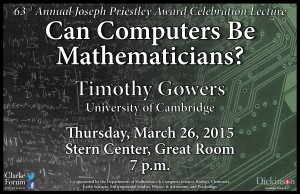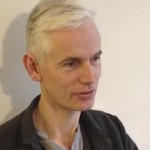 University of Cambridge
University of Cambridge
Joseph Priestley Award Celebration Lecture
Can Computers Be Mathematicians?
Thursday, March 26, 2015
Stern Center, Great Room, 7 p.m.
The ability to solve mathematical problems is often regarded as mysterious and requiring flashes of inspiration that come from nowhere. Gowers will argue that it is nothing of the kind, and that eventually computers will be better than we are at mathematics.
The Joseph Priestley Award recipient is chosen by a different science department each year. The Department of Mathematics and Computer Science has selected this year’s recipient, Timothy Gowers. The event is supported by the College’s Priestley Fund and is sponsored by the Clarke Forum for Contemporary Issues and Student Senate and co-sponsored by the departments of mathematics & computer science, biology, chemistry, earth sciences, environmental studies, physics & astronomy, and psychology.
 Biography (provided by the speaker)
Biography (provided by the speaker)
Timothy Gowers was born in Marlborough, England in 1963 in a family of musicians. He was a chorister in the choir of King’s College Cambridge, and went from there to Eton and then to Trinity College Cambridge where he read mathematics. He has spent almost all of his career in Cambridge, where he is currently the Rouse Ball Professor of Mathematics, and also a Royal Society Research Professor. He was awarded a Fields Medal in 1998 for his work in Banach space theory and combinatorics. He is the author of Mathematics, A Very Short Introduction, and the main editor of The Princeton Companion To Mathematics, for which he won the Euler Book Prize of the Mathematical Association of America in 2011.
Joseph Priestley Lecture
The Priestley Award is presented by Dickinson College in memory of Joseph Priestley, discoverer of oxygen, to a distinguished scientist whose work has contributed to the welfare of humanity. The Priestley Award, first presented in 1952, recognizes outstanding achievement and contribution to our understanding of science and the world.
